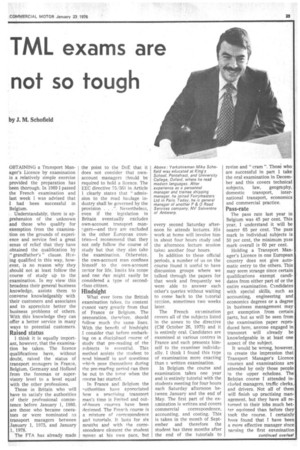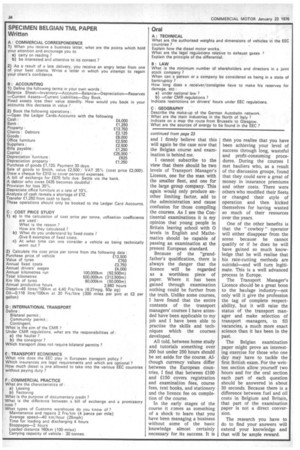TML exams are
Page 25

Page 26

If you've noticed an error in this article please click here to report it so we can fix it.
not so tough
by J. M. Schofield
OBTAINING a Transport Manager's Licence by examination is a relatively simple exercise provided the preparation has been thorough. In 1969 I passed the French examination and last week I was advised that I had been successful in Belgium.
Understandably, there is apprehension of the unknown and those who qualify for exemption from the examination on the grounds of experience and service feel a great sense of relief that they have obtained the qualification by " grandfather's" clause. Having qualified in this way, however, is no reason why they should not at least follow the course of study up to the examination. In my view this broadens their general business knowledge, assists them to converse knowledgeably with their customers and associates and to appreciate better the business problems of others. With this knowledge they can offer a better service in many ways to potential customers.
Raised status
I think it is equally important, however, that the examination be taken. The licence qualifications have, without doubt, raised the status of transport managers in France, Belgium, Germany and Holland from the foreman or supervisory level to a level equal with the other professions.
Those in Britain who will have to satisfy the authorities of their professional competence before January 1, 1980, are those who became operators or were nominated as transport managers between January 1, 1975, and January 1. 1978.
The FTA has already made the point to the DoE that it does not consider that ownaccount managers should be required to hold a licence. The EEC directive 75/561 in Article I clearly states that " admission to the road haulage industry shall be governed by the provision . . .". Nevertheless, even if the legislation in Britain eventually excludes own-account transport managers—and they are excluded in the other European countries—I recommend that they not only follow the course of study but that they also take the examination. Otherwise, the own-account man confines himself to the own-account sector for life, limits his scope and one day might easily be considered a type of secondclass citizen.
Hindsight
What ever form the British examination takes, its content cannot vary greatly from that of France or Belgium. The preparation, therefore, should follow much the same lines. With the benefit of hindsight I consider that before embarking on a. disciplined course of study that pre-reading of the subjects is essential. This method assists the student to read himself in and questions which pose themselves during the pre-reading period can then be put to the tutor when the course has started.
In France and Belgium the authotities have appreciated how a practising transport man's time is limited and outof-hours rotims have been designed. The French course is a mixture of correspondence and tutorials. It lasts for six months and with the correspondence element the student moves at his own pace, but every second Saturday afternoon he attends lectures. His work at home will involve him in about four hours study and the afternoon lecture session takes another four hours.
In addition to these official periods, a number of us on the course found it useful to have discussion groups where we talked through the papers for that week and frequently we were able to answer each other's queries without waiting to come back to the tutorial session, sometimes two weeks later.
The French examination covers all of the subjects listed in the annex to the directive (CM October 26, 1975) and it is entirely oral. Candidates are examined at various centres in France and each presents himself to the examiner individually. I think I found this type of examination more exacting than a written examination.
In Belgium the course and examination takes one year and is entirely tutorial with the students meeting for four hours each Saturday afternoon between January and the end of May. The first part of the examination is written and covers commercial correspondence, accounting, and costing. This is taken in the month of September and therefore the student has three months after the end of the tutorials to revise and " cram ". Those who are successful in part 1 take the oral examination in December and this covers technical subjects, law, geography, domestic transport, international transport, economics and commercial practice.
Pass-rate
The pass rate last year in Belgium was 45 per cent. This year, I understand it will be nearer 65 per cent. The pass mark in individual subjects is 50 per cent, the minimum pass mark overall is 60 per cent.
Holding a Transport Manager's Licence in one European country does not give automatic entry to the others. This may seem strange since certain qualifications exempt candidates from either part of or the entire examination. Candidates with special skills, such as accounting, engineering and economics degrees or a degree in business management may get exemption from certain parts, but as will be seen from the examination paper reproduced here, anyone engaged in transport will already be knowledgeable in at least one aspect of the subject.
It would be wrong, however, to create the impression that Transport Manager's Licence courses and examinations are attended by only those people in the upper echelons. The Belgian course I attended included managers, traffic clerks,. and drivers. Not all of them will finish up practising management, but they have all returned to their lobs much better equipped than before they took the course. I certainly have found that I have been a more effective manager since nassing the first examination and I firmly believe that this will again be the case now that the Belgian course and examination is behind me.
I cannot subscribe to the view that there should be two levels of Transport Manager's Licence, one for the man with the smaller fleet, and one for the large group company. This again would only produce another limiting factor, add to the administration and cause confusion for those compiling the courses. As I see the Continental examinations it is my opinion that young people in Britain leaving school with 0 levels in English and Mathematics should be capable of passing an examination at the present European standard.
Because of the "grandfather's qualification, there is always the danger that the licence will be regarded as a worthless piece of paper. Where it has been gained through examination nothing could be further from the truth. Unlike some courses, I have found that the entire contents of the transport managers' courses I have attended have been applicable to my job and I have been able to practise the skills and techniques which the courses developed.
All told, between home study and tutorials something over 200 but under 250 hours should be set aside for the course. Although currency values differ between the European countries, I find that between £100 and £150 covers registration and examination fees, course fees, text books, and stationery and the licence fee on completion of the course.
In the early stages of the course it comes as something of a shock to learn that you have been managing a business without some of the basic knowledge almost certainly necessary for its success. It is then you realise that you have been achieving your level of success through long, wasteful and profit-consuming procedures. During the courses I met hauliers who, as a result of the discussion groupsjound that they could save a great of money in insurance premiums and other costs. There were others who modified their fleets or changed their style of operation and then kicked themselves for having wasted so much of their resources over the years.
One of the other benefits is that the " cowboy " operator will either disappear from the scene because he cannot qualify or if he does he will have gained so much knowledge that he will realise that his rate-cutting methods are suicidal—and will turn legitimate. This is a well advanced process in Europe.
The Transport Manager's Licence should be a great boon to the haulage industry—not only will it give the profession the tag of complete respectability, but it will raise the status of the transport manager and make selection of transport 'managers, to fill vacancies, a much more exact science than it has been in the past.
The Belgian examination paper might prove an interesting exercise for those who one day may have to tackle the first British exam. For the written section allow yourself two hours and for the oral section each part of each question should be answered in about 30 seconds. Because there is a difference between fuel and oil costs in Belgium and Britain, that part of the examination paper is not a direct conversion.
The research you have to do to find your answers will extend your knowledge and that will be ample reward.
















































































